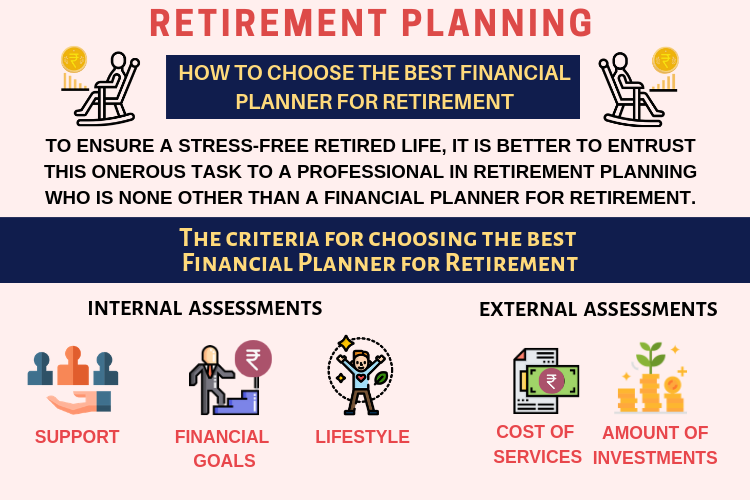Financial Planner for Retirement and Estate Planning is more than just a financial strategy; it’s a blueprint for a secure and fulfilling future. It’s about taking control of your financial destiny, ensuring your retirement years are comfortable, and leaving a legacy for loved ones.
This comprehensive approach encompasses not only retirement planning but also estate planning, ensuring your assets are managed and distributed according to your wishes.
The process begins with a thorough assessment of your current financial situation, goals, and risk tolerance. This forms the foundation for developing a personalized plan that includes retirement savings goals, investment strategies, and income projections. Equally crucial is estate planning, which involves creating legally binding documents like wills, trusts, and powers of attorney, ensuring your assets are distributed according to your wishes and minimizing potential tax liabilities.
The Importance of Financial Planning for Retirement and Estate Planning
Financial planning is an essential aspect of life, ensuring financial security and peace of mind. This involves strategic planning for retirement and estate, which can significantly impact your future and your loved ones’ well-being.
Early Financial Planning for a Secure Retirement
Early financial planning is crucial for a comfortable and secure retirement. Starting early allows you to take advantage of the power of compounding, where your investments grow exponentially over time. This means that even small contributions made early on can accumulate significantly over the years.
Financial planners help military members navigate the complex world of retirement and estate planning, ensuring their hard-earned savings are protected and passed on according to their wishes. A key aspect of this planning can include securing the right insurance coverage, such as boat insurance, which is particularly relevant for those who enjoy recreational activities on the water.
For those seeking a comprehensive guide to obtaining a boat insurance quote from USAA, a leading provider for military members, check out this helpful resource: Boat Insurance Quote USAA: A Guide for Military Members. By addressing all aspects of insurance needs, financial planners can help military members achieve peace of mind and financial security throughout their retirement years.
- Establish a Budget and Track Expenses:Understanding your income and expenses is the first step to effective financial planning. Creating a budget allows you to identify areas where you can cut back and allocate more funds towards savings and investments.
- Save Consistently:Regularly contributing to retirement savings accounts, such as 401(k)s or IRAs, is essential. These accounts offer tax advantages, making them ideal for long-term savings.
- Invest Wisely:Diversifying your investment portfolio across different asset classes, such as stocks, bonds, and real estate, can help mitigate risk and maximize returns. It is important to consult with a financial advisor to develop a personalized investment strategy that aligns with your risk tolerance and financial goals.
- Plan for Healthcare Costs:Healthcare expenses can rise significantly in retirement. It is essential to consider health insurance options and potential long-term care needs.
Benefits of a Comprehensive Estate Plan
A comprehensive estate plan ensures that your assets are distributed according to your wishes and that your loved ones are financially protected after your passing. This involves creating legal documents that Artikel your desires for your property, finances, and beneficiaries.
- Protecting Your Assets:An estate plan helps to protect your assets from potential legal challenges and ensure that they are distributed according to your wishes. This can help to prevent family disputes and ensure that your assets are used for their intended purpose.
A financial planner can help you navigate the complexities of retirement and estate planning, ensuring your assets are protected and passed on according to your wishes. A key aspect of this planning involves securing appropriate insurance coverage, and for those seeking a comprehensive guide to obtaining a USAA insurance quote, Get a USAA Insurance Quote: A Comprehensive Guide offers valuable insights.
By understanding your insurance needs, a financial planner can help you make informed decisions that contribute to a secure and well-planned future.
- Minimizing Taxes:Proper estate planning can help to minimize estate taxes and ensure that your beneficiaries receive the maximum benefit from your assets.
- Appointing Guardians for Children:If you have minor children, your estate plan should include the appointment of guardians to care for them in your absence. This ensures that your children are well-cared for and that their best interests are protected.
- Providing for Loved Ones:An estate plan allows you to provide for your loved ones financially, ensuring that they are supported after your passing. This can include providing for their education, healthcare, or other financial needs.
Potential Risks and Challenges of Not Planning for Retirement and Estate
Failing to plan for retirement and estate can have serious consequences, potentially leading to financial instability, legal disputes, and emotional distress.
- Financial Insecurity:Without proper planning, you may face financial insecurity in retirement, struggling to cover living expenses and healthcare costs.
- Increased Tax Liability:Not having an estate plan can result in higher taxes on your assets, reducing the amount your beneficiaries receive.
- Family Disputes:Lack of clear instructions in your estate plan can lead to family disputes over your assets, creating tension and conflict.
- Loss of Control:Without an estate plan, the state will determine how your assets are distributed, potentially not aligning with your wishes.
Key Components of a Financial Plan for Retirement

A comprehensive retirement plan goes beyond simply saving money. It involves a holistic approach to ensuring financial security and achieving your desired lifestyle in retirement. This plan should encompass your financial goals, investment strategies, and income projections, considering factors such as your current financial situation, risk tolerance, and desired retirement lifestyle.
Savings Goals
Setting clear and achievable savings goals is crucial for a successful retirement plan. This involves determining how much you need to accumulate to meet your expenses during retirement, factoring in inflation and potential changes in your spending patterns. For example, you may need to adjust your savings goals if you plan to travel extensively or pursue a specific hobby in retirement.
- Determine Your Retirement Expenses:Begin by estimating your annual expenses in retirement, considering housing, healthcare, travel, entertainment, and other potential needs. Remember to factor in inflation, which can significantly impact the cost of living over time.
- Calculate Your Savings Needs:Once you know your estimated annual expenses, determine the total amount you need to accumulate to cover your expenses throughout your retirement years. You can use retirement calculators or consult with a financial advisor to estimate your savings needs.
- Set Realistic Savings Goals:Based on your income and expenses, set realistic savings goals that are achievable within your timeframe. Consider adjusting your spending habits or increasing your income to reach your savings goals.
Investment Strategies
Investing your savings wisely is essential for growing your retirement nest egg. Your investment strategy should align with your risk tolerance, time horizon, and financial goals. It’s crucial to diversify your investments to mitigate risk and maximize returns.
- Diversification:Spreading your investments across different asset classes, such as stocks, bonds, and real estate, can help reduce overall risk. Diversification ensures that if one asset class performs poorly, others may offset those losses.
- Risk Tolerance:Your risk tolerance determines how much volatility you’re comfortable with in your investments. Younger investors with a longer time horizon may be more comfortable taking on higher risks, while those closer to retirement may prefer a more conservative approach.
- Time Horizon:The time horizon refers to the length of time you plan to invest. Longer time horizons allow for greater potential growth, while shorter time horizons may require a more conservative approach.
Income Projections
Estimating your income sources in retirement is crucial for determining whether your savings will be sufficient to meet your expenses. This includes considering Social Security benefits, pensions, and potential part-time income.
- Social Security Benefits:You can estimate your Social Security benefits using the Social Security Administration’s website or by consulting with a financial advisor. Keep in mind that benefits may be affected by factors such as your earnings history and retirement age.
- Pensions:If you have a pension, factor in the estimated monthly payments you’ll receive in retirement. Be aware that pension plans can vary significantly in their benefits and payment structures.
- Part-Time Income:Consider any potential part-time income you may earn in retirement, such as consulting work, teaching, or other opportunities. This can help supplement your savings and provide additional income during retirement.
Estate Planning Essentials
Estate planning is crucial for ensuring your wishes are carried out after your death and for minimizing potential tax burdens on your heirs. A comprehensive estate plan includes several key documents and strategies that work together to safeguard your assets and legacy.
Types of Estate Planning Documents
The following are the essential documents that form the foundation of a sound estate plan:
- Will:A legal document that Artikels how your assets will be distributed after your death. It names your beneficiaries and specifies how your property should be divided. A will also designates a guardian for any minor children. Without a will, your state’s laws will determine how your assets are distributed, which may not align with your wishes.
- Trust:A legal entity that holds assets for the benefit of others. Trusts can be used for various purposes, including minimizing estate taxes, protecting assets from creditors, and providing for beneficiaries with special needs. Different types of trusts exist, each with its own benefits and drawbacks.
A qualified attorney can advise you on the best trust structure for your situation.
- Power of Attorney:A legal document that grants another person (your agent) the authority to make decisions on your behalf if you become incapacitated. This includes financial, medical, and legal decisions. A power of attorney can be general, covering all aspects of your affairs, or specific, limited to certain areas.
A financial planner can help you develop a comprehensive retirement and estate plan, ensuring your assets are protected and distributed according to your wishes. Part of this process may involve assessing your insurance needs, including home insurance, which is particularly important for Rhode Island homeowners.
For guidance on obtaining the right coverage at a competitive price, check out Rhode Island Home Insurance Quotes: A Guide for Homeowners. A solid home insurance policy can provide peace of mind and safeguard your financial future, allowing you to focus on enjoying your retirement years.
Designating Beneficiaries for Assets and Accounts
Naming beneficiaries for your assets and accounts is essential for ensuring your assets are distributed according to your wishes. Beneficiary designations override the instructions in your will.
- Retirement Accounts:Designate beneficiaries for your 401(k), IRA, and other retirement accounts. These accounts can pass directly to your beneficiaries without going through probate, potentially saving your heirs time and money. However, be mindful of potential tax implications associated with beneficiary inheritances.
- Life Insurance Policies:Designate beneficiaries for your life insurance policies. The death benefit will be paid directly to the named beneficiaries, providing financial support for your loved ones.
- Bank Accounts and Investments:Designate beneficiaries for your bank accounts, brokerage accounts, and other investments. This ensures that your assets will be transferred to the intended recipients without delays or complications.
Strategies for Minimizing Estate Taxes
Estate taxes can significantly reduce the amount of wealth passed on to your heirs. There are several strategies to minimize these taxes:
- Gifting:You can give away assets during your lifetime, taking advantage of the annual gift tax exclusion. The annual exclusion amount for 2023 is $17,000 per recipient, allowing you to gift up to $34,000 to a married couple. These gifts reduce the size of your taxable estate and may also be subject to lower tax rates than if you were to pass them on at death.
- Charitable Giving:Charitable donations can reduce your taxable estate and potentially qualify for a tax deduction. Consider making outright gifts, establishing a charitable remainder trust, or setting up a donor-advised fund.
- Trusts:Certain types of trusts can help minimize estate taxes by transferring assets to the trust and allowing them to grow tax-free. Consult with a qualified attorney to explore trust options that may be suitable for your situation.
Finding the Right Financial Planner: Financial Planner For Retirement And Estate Planning

Navigating the complex world of retirement and estate planning requires expert guidance. A qualified financial planner can help you develop a comprehensive strategy tailored to your unique needs and goals. Finding the right planner is crucial for ensuring your financial well-being and achieving your desired outcomes.
Qualifying a Financial Planner
Choosing a financial planner involves evaluating their qualifications, experience, and approach.
- Professional Credentials:Look for planners with recognized certifications such as Certified Financial Planner (CFP®), Chartered Financial Consultant (ChFC®), or Certified Public Accountant (CPA). These credentials demonstrate a commitment to professional standards and ongoing education.
- Experience:Seek out planners with extensive experience in retirement and estate planning. A proven track record of success can instill confidence in their abilities.
- Specializations:Determine if the planner has specialized knowledge in areas relevant to your situation, such as tax planning, investment management, or insurance.
- Client Testimonials:Reading reviews and testimonials from past clients can provide valuable insights into the planner’s communication style, responsiveness, and overall client satisfaction.
- Fee Structure:Understanding the planner’s fee structure is essential. Fee-only planners charge a flat fee or hourly rate, while commission-based planners earn a commission on products they sell. Transparency and clarity regarding fees are crucial.
Types of Financial Planners
Financial planners operate under different fee structures, each with its own advantages and considerations.
- Fee-Only Planners:These planners charge a flat fee or hourly rate for their services. They are not incentivized to sell specific financial products, providing unbiased advice based on your needs.
- Commission-Based Planners:These planners earn a commission on the financial products they sell, such as insurance or investment products. While they may provide valuable services, their incentives can influence their recommendations.
- Hybrid Planners:Some planners combine fee-based and commission-based approaches. They may charge a fee for initial planning services and earn commissions on subsequent product sales.
Building a Strong Relationship, Financial Planner for Retirement and Estate Planning
Establishing a strong relationship with your financial planner is crucial for effective planning.
- Open Communication:Communicate your goals, values, and risk tolerance openly and honestly. A strong relationship is built on trust and transparency.
- Regular Meetings:Schedule regular meetings to review your financial plan, discuss progress, and address any changes in your circumstances.
- Proactive Engagement:Actively participate in the planning process, ask questions, and seek clarification. A collaborative approach leads to better outcomes.
Last Point

Navigating the complexities of retirement and estate planning can feel daunting, but with a well-crafted plan and the guidance of a qualified financial planner, you can navigate these challenges with confidence. By taking proactive steps today, you can secure a comfortable retirement and create a legacy that reflects your values and aspirations.
Remember, the key is to start early, seek expert advice, and regularly review and adjust your plan to ensure it aligns with your evolving needs and goals.




